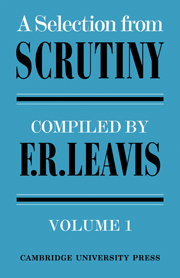2 - T.S.ELIOT
Published online by Cambridge University Press: 08 January 2010
Summary
Selected Essays, by T. S. Eliot (Faber and Faber)
This substantial and comely volume contains the greater part of Mr Eliot's influential criticism. There is about half of The Sacred Wood, the three essays from the crucial Homage to Dryden pamphlet and the Dante study entire. The additions on the literary side include essays on Middleton, Heywood, Tourneur and Ford; two excellent studies of Senecan influence on Elizabethan drama, a rather discouraged dialogue on Dramatic Poetry and an essay on Baudelaire.
The novelty in the essays on the dramatists and on Baudelaire is the appearance of Mr Eliot as an appreciator of moral essences. In this encroachment on the domain of such verbose critics as Mr Murry and Mr Fausset, he is not, of course, trying to put across an individual conception of morality; tradition governs this as much as it does taste. Mr Eliot's tradition of morality is the most respectable of all, and when he says that ‘the essence of the tragedy of Macbeth is the habituation to crime’, one could do nothing but assent if it were not that the italics show that he is not referring to the man but to the play. Again, he tells us,‘In poetry, in dramatic technique, The Changeling is inferior to the best plays of Webster. But in the moral essence of tragedy, it is safe to say that in this play Middleton is surpassed by one Elizabethan alone, and that is Shakespeare.’ But even if that is a safe thing to say, the way of saying it is not free from danger.
- Type
- Chapter
- Information
- A Selection from Scrutiny , pp. 47 - 88Publisher: Cambridge University PressPrint publication year: 1968



